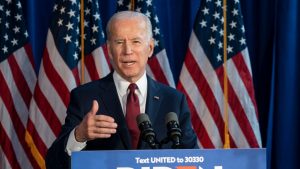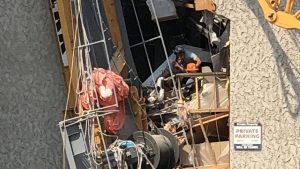Two heavyweight construction unions have agreed to set aside years of differences, reaching an agreement to co-operate on a range of issues including establishing a mechanism to avoid jurisdictional disputes.
Local 793 of the International Union of Operating Engineers (IUOE) and Labourers’ International Union of North America Local 183 (LIUNA) had negotiated since last fall until an understanding was reached. Their 2017 Mutual Co-operation Agreement was signed in Toronto on Jan. 27 by Local 793 business manager Mike Gallagher and Local 183 business manager Jack Oliveira.
"Over the past few years we have been fighting each other rather than working collaboratively," said Oliveira in a statement announcing the deal. "I am happy we were able to put that behind us, and that we are moving forward to level the playing field. This level of co-operation will be good for our members and for members of Local 793."
Elements of the pact include a framework for resolving outstanding jurisdictional disputes and avoiding future ones, commitments to work together in organizing and collective agreement enforcement and an agreement on strategies for greater co-operation in utilities work as well as the sewer and watermain, roads and heavy engineering sectors in the Greater Toronto Area, parts of south central Ontario and parts of eastern ontario.
The IUOE Local 793 represents some 15,000 crane and heavy equipment operators across Ontario. LIUNA Local 183 is the largest construction local in North America with more than 50,000 workers active throughout the construction industry.
Gallagher said years back, 793 and 183 co-operated extensively including negotiating and signing contracts jointly with employers in sectors of joint interest. But of late, he said, a combination of factors including an influx of new union leaders led to mistrust, and according to his count at one point recently there were 10 jurisdictional disputes (JDs) that often had to be resolved by the Ontario Labour Relations Board (OLRB).
"There was not very good communication between our leaders, between myself and Jack, and not good communication at the field level between the reps, and it just kind of tumbled into us not being able to work anything out," he said. JDs often surfaced because of new technology or new types of builds, Gallagher explained, such as the construction of solar power plants in eastern Ontario where there were no precedents for determining who should do the work.
Graham Williamson, senior legal counsel for 183 who was involved in the negotiations, said much of the bad blood stemmed from 183 and 793 fighting to organize operators of hydrovac and excavac trucks. The two unions battled to sign collective agreements for those workers with different companies and sometimes with the same company. Worksite disagreements and grievances often ensued.
"That is where we have had the issues but it has spilled over into other areas," he said.
Finally direction came from national executives to create peace in Ontario. Gallagher said a high-level meeting near Pearson airport that included Lionel Railton, Canadian director of the IUOE, and Joe Mancinelli, LIUNA international vice-president and regional manager, got the ball rolling.
"The nice thing about this settlement, it is very historic in that not only did we settle about five jurisdictional disputes, we also have agreed on how we can avoid having them in the future," said Gallagher. "We have agreed to a process where we will be able to work out differences of opinion internally without having to take them to the OLRB. So that is pretty significant."
Williamson commented, "Like all agreements it is a first step, and it all depends how we implement it and how well meaning we are. It was certainly entered into in good faith, and even more than what is written down on paper is the commitment from both business managers to have a co-operative and good working relationship."
Negotiating contracts together will benefit everyone in the industry, Gallagher added.
"When we worked together before we had better communication and were able to arrive at an agreement with the contractors and everybody in the room would understand what we agreed to," he said.
"My wish really for the industry is, to our employers out there, to embrace the concept. It’s good for the contractors, it’s good for the employers, it’s good for the industry and good for the people that work for them and our members."





Recent Comments
comments for this post are closed